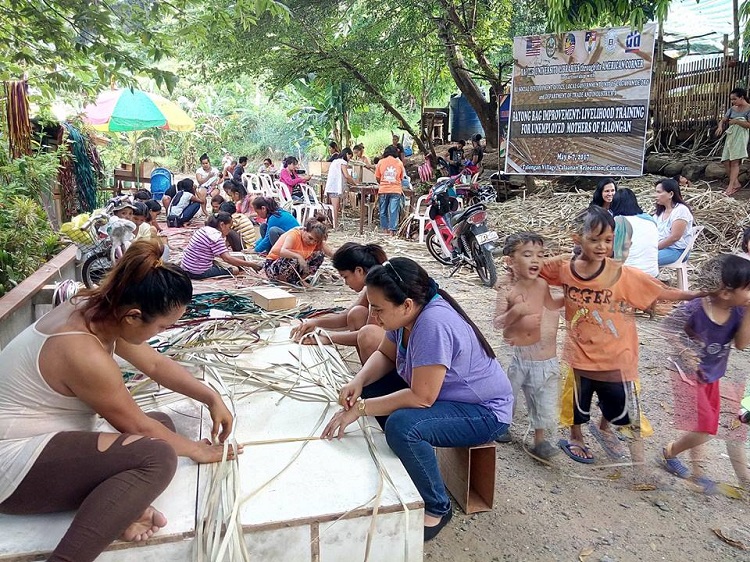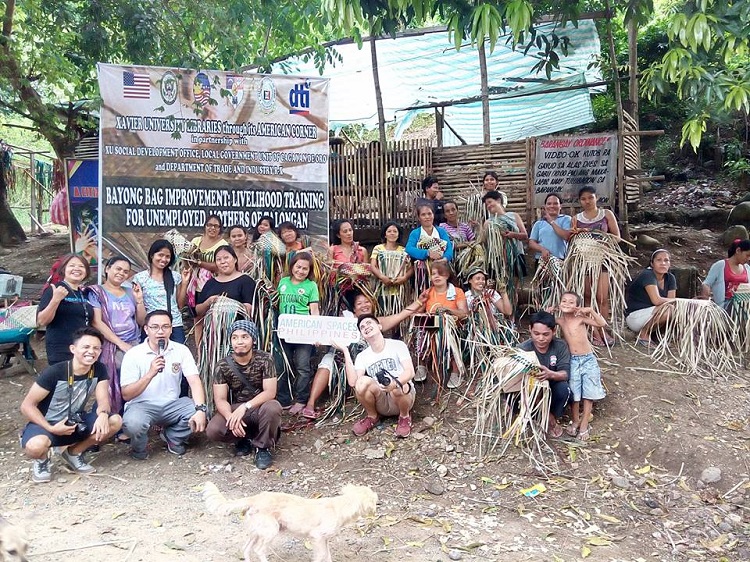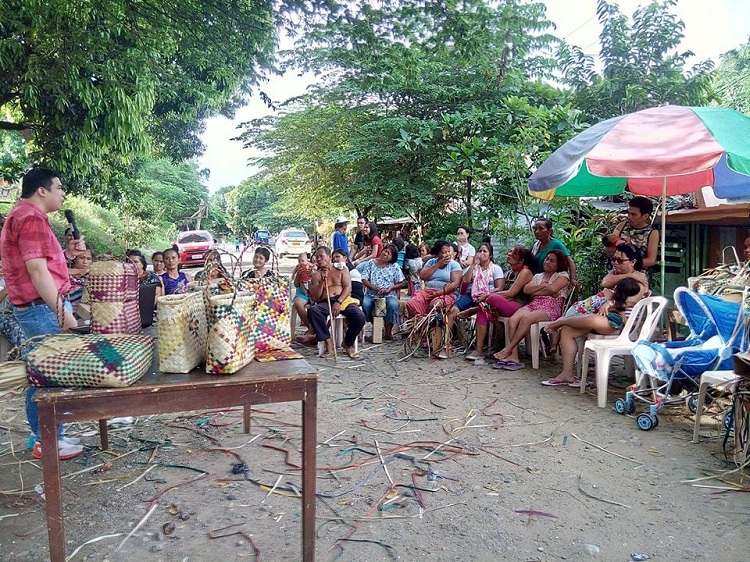
BAYONG PROJECT. Mothers of Talongan village in Barangay Canitoan participate in the livelihood project, weaving bayong or basket bags.
Text and photos Harmony Kristel D Balino, with reports from Kyle Phil F Cabingas
In the City of Golden Friendship, there exists a small village on the uphill of Barangay Canitaon called Talongan. In this little village lives a small community of 40 families, all residing a simple life in a relocation site. With genuine smiles as the villagers’ warm introduction, one wouldn’t guess that these villagers are a faction of the survivors of Tropical Storm Sendong (Washi) that haunted the city over five years ago today.
The little village enjoys the natural aesthetic of a country environment; where, in a slightly higher altitude than the rest of the city, has the luxury of a cooler climate amid the summer heat. In this humble little village, children play under the shed of the trees that line the village’s unpaved road, mothers oversee their own households, and fathers go out to work.
In such a simple lifestyle comes the grandeur of time for most of the mothers in the village. Seeing this as an opportunity, the Xavier Ateneo Libraries, through its American Corner, came up with a plan: to extend an outreach to the Talongan villagers by opening up a livelihood – bayong (basket) weaving. Partnering with XU’s Social Development cluster, Cagayan de Oro City local government unit (LGU), and the Department of Trade and Industry (DTI), the first phase of this outreach transpired in 2015.
Over a year later, on the 6th and 7th of May 2017, followed a sequel that taught a higher level of basket weaving to the mothers. This project was then called Improvement of Basket Weaving: A Livelihood Training for Non-working Mothers of Talongan Village. The first project taught the basics of basket weaving. This time, the trainers up the weaving by touching on dying the weave material and mentoring the trainees to a more intricate weaving style.
Bayong or basket bags are known to be a Filipino craft. These hand-made bags are popularly manufactured in Visayas and Mindanao where its material, Romblon leaves, are abundant. Mentoring the women of the village on how to basket weave is not merely handing them a livelihood but also exposing them to a Filipino heritage art.
A jeepney-full of dried Romblon leaves were brought to the village on May 6. Under the shade of a tree on Talongan Village’s unpaved road, the two-day training commenced. Representatives from the organizers came to speak, hosted by SD advocacy coordinator Nestor Banuag Jr (formerly Kristohanong Katilingban sa Pagpakabana – Social Involvement Office director). XU Libraries director and American Corner CDO area director Estrella Cabudoy welcomed the 36 participants of the training. LGU estate management division officer-in-charge Floresa Sabuga-a expressed her support for the project as it heightens one of the advocacies of her office: to support relocated survivors in livelihood. Randolf Mariano from the public affairs section of the US Embassy in Manila delivered an inspirational talk to the participants, motivating them to continue their engagement in the training.

UNDER THE TREE. A jeepney-full of dried Romblon leaves were brought to the Talongan village on May 6. Under the shade of a tree the two-day training on bayong weaving happened.
Experts of basket weaving were hired as trainers through the referral of DTI. First, these trainers went through a refresher course in basic basket-weaving. Then, they were taught on how to make a hand-made device of cut blades sandwiched by wooden cubes. This device is used to cut the weave material – Romblon leaves – into weave-appropriate sizes. The leaves are positioned at the mouth of the devices and are pulled through it – slicing the leaf into three. After cutting enough for weaving, the trainers gave instructions for dying the Romblon leaves. The dye solution, after boiling it for over half an hour, was then diluted into a container of water and leaves were soaked. Since drying dyed leaves took time, it was settled that weaving would be the next step.
The second day’s activity began midmorning when the sun was fully out, gracing the village with good lighting. Everyone started gearing up for the tree planting, as part of the sustainability of the livelihood was to have a direct supply of Romblon leaves. Forty seedlings given to the care of each of the 40 families in Talongan village were planted on that day. These seedlings were strategically sowed proximal to the creek that flows in the village. After, the weaving continued. On that day, the trainees were able to finish a total of six bayongs.
By mid-afternoon, everyone was gathered for a kamustahan session or a conversational evaluation on the two-day training, facilitated by DTI representative Erwin Hamaca. The trainees expressed a variety of feedback ranging from self-doubt in terms of capability to weave to confidence that this training will pave the way to become an enterprise in the near future. To give the trainees more insights on what they’re venturing into, Hamaca presented business plans the trainees could use, once their craft becomes an enterprise. Concisely, he laid out financial prospects of this kind of enterprise. With a honed skill in delivering lectures and classic humor, Hamaca easily elicited insights from his listeners on the topic.
Being active listeners, the trainees were able to come up with a pool of sustainability insights. These included the need for commitment, unity, timbayayong (camaraderie), consistency, patience, hard work, and perseverance. Unbeknownst to them, the trainees are on the first step of molding themselves to become entrepreneurs – by having an ambition and setting a mindset for the prospective enterprise.
The highlight of the closing ceremony was the hired trainers’ departing remarks. As experts of this craft and its place in the market, the trainers urged the participating mothers of Talongan to continue on the craft and business plans with consistency and commitment. They warned everyone against potential hurdles that the trainees might encounter if they pursue this enterprise and that, to not lose heart because the outcome is much more rewarding.
A series of meetings will take place between the SocDev and its partners for this project. After two training sessions over a year apart, the organizers believe that this initiative would bear fruit to everyone’s efforts – including theirs. Since the beginning of the planning and preparation of this livelihood training, the sustainability of this endeavor has been a top concern and it continues to be. Efforts are being exerted in guiding the mothers of Talongan village into legitimizing their enterprise through registering their group in the Department of Labor and Employment (DOLE).
Each bayong is priced at Php70.00 each.∎

WHAT'S NEXT. Efforts are being exerted in guiding the mothers of Talongan village into legitimizing their enterprise through registering their group in the Department of Labor and Employment.